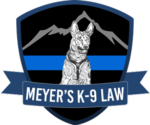The courts have recognized many times that a failure to locate contraband by the handler or other searching human officers is not necessarily a failure on the part of the K9. As explained in many cases, the K9 is alerting to the scent of controlled substances, not the presence of controlled substances. Therefore, the vehicle could have recently contained controlled substances, but had been removed by the time of the sniff. Also, the K9 could be alerting to the scent of controlled substances left on a door handle or on the person of an occupant (if the occupants were left in the car at the time of the sniff). Courts have also recognized that controlled substances could be present, but are so well hidden the human officers were unable to locate them. As long as your K9 is well trained, the K9’s alert is probable cause to search. A subsequent failure by the K9’s fellow human officers to locate controlled substances does not vitiate probable cause.
But see Hernandez v. Boles (6th Cir. 2020) U.S. App. LEXIS 2948 out of Tennessee. K9 performed free air sniff during a traffic stop and alerted. The handler then placed K9 inside the car and K9 got distracted by a bag of fast food in the car and began eating it. After being redirected, the K9 failed to alert and handler, embarrassed, pulled K9 out and told other officers K9 failed to alert. Handler shook hands with all occupants and gave them a “thumbs up”, apparently indicating they were cleared. Supervisor on scene authorized a vehicle search anyway. Court held that the PC from the alert outside the car was dissipated upon the failure of the K9 to alert inside the car. However, since there was no case law directly on point, the court found qualified immunity, so no civil liability attached. However, the criminal case was dismissed because the evidence was suppressed. The take away here is that handler didn’t trust the first alert and ended up erasing probable cause from the situation with the interior search. Once you have PC, no need to look for more.
